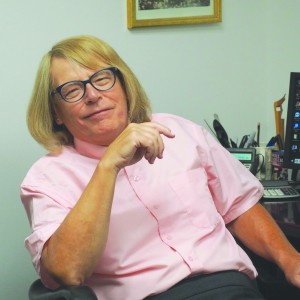 Reverend Donnie Anderson is the executive minister of The Rhode Island State Council of Churches, and a Rhode Island spiritual, social and intellectual leader. In recent years, Reverend Anderson has outwardly transitioned from man to woman.
Reverend Donnie Anderson is the executive minister of The Rhode Island State Council of Churches, and a Rhode Island spiritual, social and intellectual leader. In recent years, Reverend Anderson has outwardly transitioned from man to woman.
During our compelling conversation, Reverend Anderson spoke of her experiences on her journey toward self-actualization.
Donnie Anderson: For 69 years of my life I knew that there was something different about me, but didn’t know what it was. I remember when I was 9, I tried to raise the issue with my mom, [that I was] drawn to the feminine more than the masculine, not in those words of course, but, trying to raise that conversation.
My mom gave me a very specific reply. One, that she loved me very much, but there are “two teams and I played for the other team, end of story, and we just will never talk about this again.”
Of course, when I was growing up in the ’50s and even into the ’60s, if you were male and had an inclination toward the feminine, you were gay. Well, I was attracted to women, not men. So that definition didn’t work. And so there really wasn’t any definition that worked. I think it’s hard sometimes for people to realize and remember that there was no internet. If you wanted to look at something, you had to go to the library.
There were no books in the library about transgender themes. So, I led most of my life figuring that I was the only one in the world who was experiencing this.
I found out there’s a whole bunch of other people who were having the exact same experience thinking they were the only ones. It wasn’t until very late in my life that I realized that there was a difference between sexual orientation and gender identity. I began thinking, could that explain who I am? Could that maybe explain what I’m about? And, sure enough, about four years ago, I just said it out loud. I looked in the mirror and said, “Let’s face it, you’re a woman. That’s what you are.”
Bill Bartholomew: Does RI have an environment that, by and large, allowed for a supportive framework for you during your transition period?
DA: There’s no question in my mind that RI is a great place to transition. Let me give you an example: So we think Massachusetts is just as cool, right? But in Massachusetts they have a resistance group that is incredibly anti-transgender, that is well organized and has actually started a national movement. We don’t have that here.
I mean, not that there aren’t negative people, [not that] there aren’t people who don’t like people like me, but it’s not organized in the way it is in Massachusetts.
The other thing is, Rhode Island is a small state. You know what I mean? I had letters or calls or direct words of encouragement from everyone from the governor on down, who reached out intentionally to say, “I want to support you and wish you the best, and whatever we can do to help, let us know.” So, yeah, Rhode Island is a great place and I think the fact that we’re smaller, and the fact that we have a really good-sized group of people who get that this is part of the human experience [makes] this a good place. Part of that, too, is because over the last 15 to 20 years, folks who are part of the transgender community came out and demonstrated that there was nothing to be afraid of.
[Those pioneers] paid a price, and I am profoundly aware that I am the recipient of the work that others did, and I’m in debt to them. There’s no question about that. And in many ways there’s plenty of work to do for sure.
BB: What is the foundation of these anti-transgender group’s positions? Where are they coming from? What’s their angle?
DA: Sadly from my perspective, many of them use a religious perspective and say, “God intended for there to be man and woman,” and they see gender as binary, and that’s just the way it’s intended to be, that (living as transgender) is the ultimate perversion of God’s intention for the world. So you have some very religious people give that rationale. There’s a whole group of other people who are not particularly religious, but say, “Aha, that’s a great argument.” So even though they may not be religious themselves, they log on to that argument and use that argument to talk about the way things used to be. Some of the code words that are used are traditional values, family values — those are all code words for a very binary understanding of gender.
One of the things that’s really interesting, and I haven’t done as much research into this as I’d really like to, but, near the end of the first century of the common era up to approaching the Middle Ages, in Judaism, there actually was a school of thought that talked about five different gender expressions in the Hebrew scripture. I want to do more work on that because as a Christian, our whole faith is built upon the foundation of the Hebrew scripture. So I think that enlightens and helps us understand what’s in the Christian writing.
To hear the complete episode of The Bartholomewtown Podcast with Reverend Donnie Anderson subscribe on Apple Podcasts or visit bartholomewtown.com or RIpodcast.com